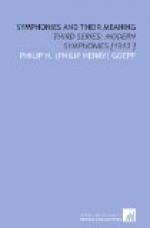Here lies the nobility of the common people and of its song; the national phase is a mere incident of political conditions. The war of races is no alembic for beauty of art. If there were no national lines, there would still be folk-song,—merely without sharp distinction. The future of music lies less in the differentiation of human song, than in its blending.
Thus we may rejoice in the musical utterance of a race like the Russian, groaning and struggling through ages against autocracy for the dignity of man himself,—and in a less degree for the Bohemian, seeking to hold its heritage against enforced submergence. But we cannot take so seriously the proud self-isolation of other independent nations.
BALAKIREW.[A] SYMPHONY IN C
[Footnote A: Mili Alexeivich Balakirew was born at Nizhni-Novgorod in 1836; he died at St. Petersburg in 1911. He is regarded as the founder of the Neo-Russian School.]
The national idea shines throughout, apart from the “Russian Theme” that forms the main text of the Finale. One may see the whole symphony leading up to the national celebration.
As in the opening phrase (in solemn Largo) with
[Music: (Lower reed, with strings in three 8ves.) Largo]
its answer are proclaimed the subjects that presently
[Music: (Flute and strings)]
appear in rapid pace, so the whole movement must be taken as a big prologue, forecasting rather than realizing. There is a dearth of melodic stress and balance; so little do the subjects differ that they are in essence merely obverse in outline.
Mystic harmonies and mutations of the motto lead to a quicker guise (Allegro vivo). Independently of themes, the rough edge of tonality and the vigorous primitive rhythms are expressive of the Slav feeling. Withal there is a subtlety of harmonic manner that could come only through the grasp of the classics common to all nations. Augmentation and diminution of theme abound, together with the full fugal manner. A warm, racial color is felt in the prodigal use of lower reeds.[A]
[Footnote A: Besides the English horn and four bassoons there are four clarinets,—double the traditional number.]
In all the variety of quick and slower melodies a single phrase of five notes, the opening of the symphony, pervades. In all kinds of humor it sings, martial, solemn, soothing, meditative, or sprightly. Poetic in high degree is this subtle metamorphosis, so that the symphony in the first movement seems to prove the art rather than the national spirit of the Neo-Russians.
Of the original answer is wrought all the balance and foil of second theme, and like the first it reaches a climactic height. But the first is the sovereign figure of the story. It enters into the pattern of every new phase, it seems the text of which all the melodies are fashioned, or a sacred symbol that must be all-pervading. In a broader pace (Alla breve) is a mystic discussion of the legend, as of dogma, ending in big pontifical blast of the answering theme.




